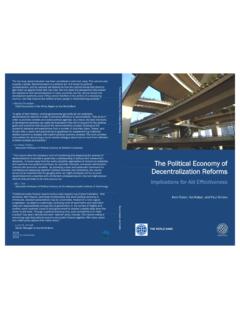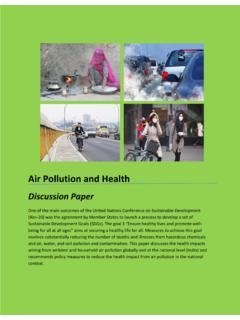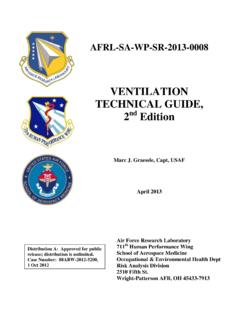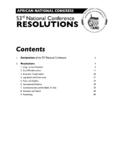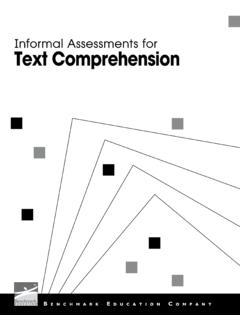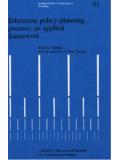Transcription of PUBLIC EXAMINATIONS, NATIONAL AND …
1 PUBLIC EXAMINATIONS, NATIONAL AND international ASSESSMENTS, and educational policy . Thomas Kellaghan educational Research Centre St Patrick's College, Dublin May 2004. In this paper, I shall first describe growth in the interest of policy -makers in using assessment procedures to obtain information about what students learn as a result of their experience in school. I shall then describe three procedures which are available in many, though not in all, countries to provide this information: PUBLIC (external) examinations, NATIONAL assessments, and international assessments of educational achievement. Finally, I shall consider the extent to which information derived from each procedure can provide policy -makers with the kind of information they require.
2 assessment and policy The term assessment ' may be used in education to refer to any procedure or activity that is designed to obtain information about the knowledge, attitudes, or skills of a learner or group of learners. Information derived from an assessment can be used for a great variety of purposes: to make educational decisions about students ( , promotion, grade retention, certification of achievements); to give feedback to students about their progress, strengths, weaknesses; to motivate students by providing goals or targets; to judge instructional effectiveness and curricular adequacy; to describe the achievements of an education system; to assess the effectiveness of schools; to monitor student achievements over time; and to guide policy formation and decision-making.
3 During the 1990s, assessment came to the fore in educational policy as concern grew about what students were actually learning in school. While up to then, the main focus in assessing the quality of education was on inputs ( , physical facilities, curriculum materials, access to textbooks, teacher training), the shift to a 2. concern about outputs asked if students as a result of their exposure to schooling acquired appropriate knowledge, skills, behaviour, and attitudes. A number of issues can be identified as giving rise to concern about student learning. First, it cannot be assumed that because a child has been to school that he or she has, in the words of the World Declaration on Education for All, actually acquired useful knowledge, reasoning ability, skills and values' (UNESCO, 1990, par.)
4 4). Indeed, the available evidence indicates that many students (particularly ones with short educational careers) benefit little from their educational experience. Secondly, there is concern that even the competencies acquired by students who stay in the education system for a long time may not be adequate to meet the needs of the information-based global competitive economy of the 21st century. Thirdly, interest in obtaining information on the achievements of students has been fuelled by the development of corporatist and managerial approaches to government administration. Just as the management of a business requires information on outputs, not just inputs, so too, it is argued, management of the education system requires knowledge of what is being achieved.
5 Finally, interest in assessing student learning has grown in countries where PUBLIC services are being reorganized to allow for the use of decentralized and relatively autonomous service providers. This has given rise to a need for new contractual arrangements, regulation, and compliance monitoring, which in turn require procedures to check that organizations (schools or local education authorities) are delivering flexible cost-effective services to users. The following six questions identify issues of particular concern to policy - makers in their quest for information about students' learning. 3. How well are students learning in the education system (with reference, for example, to general expectations, EFA goals, the aims of the curriculum, or preparation for life)?
6 Is there evidence of particular strengths or weaknesses in the knowledge and skills students have acquired? Do the achievements of subgroups in the population differ? Are there, for example, disparities between the achievements of boys and girls, of students in urban and rural locations, of students from different language or ethnic groups, of students in different regions of the country, of students who drop out early or are repeating grades? To what extent is achievement associated with the characteristics of the learning environment ( , school resources, teacher preparation and competence, type of school) or with students' home and community circumstances? Do the achievements of students change over time? This can be particularly important at a time of major change in the system ( , when numbers are increasing.)
7 When new subjects or curricula are being implemented). How do the achievements of students compare with the achievements of students in other countries? (Kellaghan, 2003; Kellaghan & Greaney, 2001b). Procedures to Provide Information on Student Learning There are three major procedures which can provide information on student learning in many, though not in all, countries: PUBLIC (external) examinations; NATIONAL assessments; and international assessments of educational achievement. Though all three would fit the definition of assessment I provided, I will observe conventional 4. use by using the terms examinations to refer to PUBLIC examinations and assessment to refer to NATIONAL and international PUBLIC (External) Examinations PUBLIC (external) examinations have played a major role throughout the history of modern education in Africa.
8 In most countries, three major examinations are administered by an agency outside the school (usually a NATIONAL examinations authority in anglophone countries and a ministry of education in francophone countries): at the end of primary schooling when students are examined in the major subjects of the curriculum ( , English or French, a local language, science, and social studies); after two or three years in secondary school usually in a wider range of subjects; and at the end of secondary school. The role of examinations in secondary education is key, dictating what is taught in schools, and acting as gatekeepers guarding entry to schools, selecting students during the course of their careers, and providing an evaluation of students when leaving school that is likely to have very important implications for their further education and even life chances.
9 The continued existence and central importance of PUBLIC examinations in Africa can be attributed to the fact that they serve a number of important functions. First, by providing a specification of clear goals and standards for teachers and students, they control the disparate elements of the education system, helping to ensure that all schools teach to the same standards. Second, in selecting students for further education, they are perceived to allocate scarce educational benefits in an objective and unbiased way. Third, examinations have a certification function, though this is often lost sight of because of the emphasis on their use for selection. Formal 1. Some countries do not have a PUBLIC examination system, leaving it up to individual schools to certify the achievements of their students.
10 However, there has been a move in recent years in these countries ( , the United States of America, eastern European countries) to introduce examination systems. 5. certification of academic achievements, however, can be important for some students in gaining access to employment or training. Fourth, examinations can be used to underpin changes in curriculum and teaching methods, and to maintain NATIONAL standards. Fifth, examinations, especially when results are published, may serve an accountability function for teachers and schools. Finally, examinations at the end of secondary schooling legitimate membership in the international global society, and facilitate international mobility (Kellaghan, 1992; Kellaghan & Greaney, 1992;. Kellaghan & Greaney, 2004).






